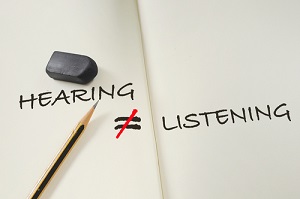
Perhaps the most underrated skill for a financial planner or adviser is listening.
Is there anything more important?
I appreciate that you need to know what you are talking about. But this is a given, isn’t it?
Unless you are highly specialised, technical knowledge is not a ‘stand out’ quality that makes you significantly different from any other adviser.
Yet the quality of your listening certainly is.
So, how can you become an outstandingly good listener and, as a result, create exceptional relationships and deliver even more value?
The most common form of listening that advisers do
You have probably spent hundreds of hours gaining your qualifications and this enables you to expertly solve financial problems.
Therefore, it is extremely easy to conduct your meetings with clients or potential clients listening through a ‘problem solving’ filter. You listen out for problems you can solve and then you offer advice.
This seems to make sense and it was how I used to listen.
Yet I began to notice that listening in this way resulted in transactional relationships and I wanted to move away from this and create more value for my clients.
What is the true value of advice?
Financial planning and advice, if it is to be engaging and compelling, must be meaningful in a client’s life.
So, there needs to be a clear connection between the actions a client is being advised to take and what matters most to them in their life.
Ultimately, and this is often misunderstood by advisers, the true value of advice is how it improves a client’s quality of life now.
As Michael LeBoeuf says in his book, ‘How to win customers and keep them for life‘:
“Don’t sell me insurance. Sell me peace of mind and a great future for my family and me.”
A new way of listening
I learned that the most powerful and impactful way that you can listen to someone is with nothing on your mind.
Some people call this ‘deep listening.’
Listening in this way is quite different to how I used to listen and it took, and still takes, practice. Our old habits can be deeply ingrained.
Deep listening means dropping all your thoughts so that you can listen with a completely open mind.
So, you are not listening out for problems to solve, agreeing, disagreeing, comparing, judging, analysing or, in fact, being active in your thinking in any way.
I understand that this seems to go against your professional training. But if we are to create relationships that are founded in the very deepest levels of trust, human connection, love, kindness, and understanding, then listening in this way is the foundation.
When you practice deep listening what you are communicating to the other person is that ‘you really matter to me.’ What also happens is that it promotes clearer thinking in the speaker and well as a deeper human connection between you.
Practice from your very next conversation
The very next conversation you have is an opportunity to listen deeply. Allow yourself to be fully present, feel at ease, and under no pressure. And enjoy the results.
PS. One way that advisers can compromise their listening is being concerned with making a good impression with a client. Click here to read more on why you do not need to try and prove your value.


